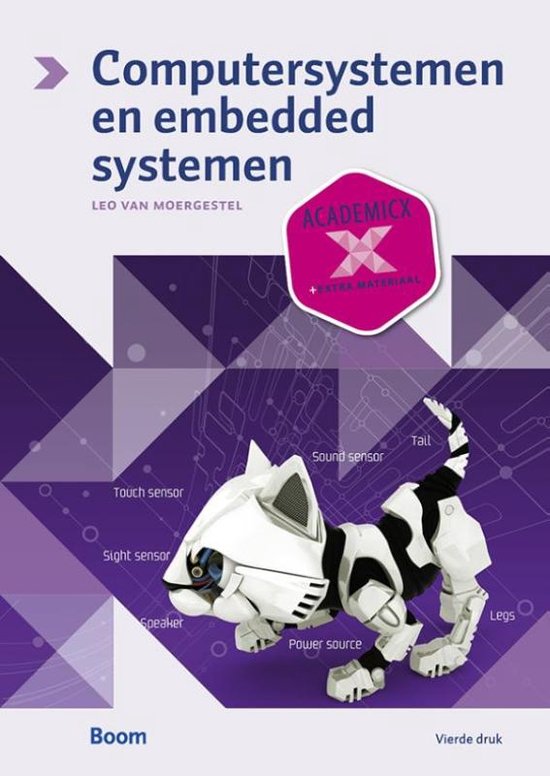Hoofdstuk 15 - Computernetwerken
15.2 - Algemene begrippen
15.2.1 - LAN, WAN, MAN, PAN
LAN = local area network, binnen een gebouw of gebouwencomplex.
WAN = wide area network, koppelingen tussen systemen over openbare communicatienetten.
MAN = metropolian area network, ligt tussen de LAN en WAN in.
PAN = personal area network, denk aan koptelefoon en draadloze muis.
15.2.2 - Netwerktopologie
Bustopologie = alle computers parallel met een communicatiekanaal verbonden.
Stertopologie = de systemen zijn samen met één centraal netwerksysteem verbonden.
Ringtopologie = de systemen zijn in een ringvorm gekoppeld.
15.2.3 - ISO/OSI-referentiemodel
Het OSI-model bestaat uit 7 lagen:
1. Physical layer, hardware.
2. Datalink layer, software die met de netwerkhardware communiceert.
3. Network layer, regelt de opbouw en doorstroom van de datapakketen.
4. Transport layer, verzendt de pakketten.
5. Session layer, zet de communicatie op en sluit deze af.
6. Presentation layer, codeconversie.
7. Application layer, communiceert met het proces, deze laag laat programma’s functioneren.
15.2.5 - Hosts en netwerkinfrastructuur
De systemen die gebruik maken van de infrastructuur zijn hosts of eindnodes. De systemen die de
datatransport faciliteren noemen we intermediary devices (IMD) genoemd en de verbinding zelf
noemen we media.
Wanneer alle systemen geen specifieke functie hebben binnen een netwerk is het een peer-to-peer
netwerk. Zijn er systemen met een specifieke functie is het een client-server netwerk.
15.2.6 - Circuit switching, packet switching, het datagram en virtueel circuit
Circuit switching = vergelijkbaar met de ouderwetse telefonie, je schakelt waardoor twee apparaten
een verbinding met elkaar krijgen.
Packet switching = een pakket data met daarin de informatie waar hij naartoe moet. Dat pakket gaat
langs verschillende knooppunten om zo bij zijn eindbestemming te komen.
Datagram, de communicatie loopt via een pakket van de ene naar de andere host.
Virtueel circuit, A wilt communiceren met B, A zet een communicatielijn op en verzend de
data, wacht even en verbreekt de verbinding weer.
15.2 - Algemene begrippen
15.2.1 - LAN, WAN, MAN, PAN
LAN = local area network, binnen een gebouw of gebouwencomplex.
WAN = wide area network, koppelingen tussen systemen over openbare communicatienetten.
MAN = metropolian area network, ligt tussen de LAN en WAN in.
PAN = personal area network, denk aan koptelefoon en draadloze muis.
15.2.2 - Netwerktopologie
Bustopologie = alle computers parallel met een communicatiekanaal verbonden.
Stertopologie = de systemen zijn samen met één centraal netwerksysteem verbonden.
Ringtopologie = de systemen zijn in een ringvorm gekoppeld.
15.2.3 - ISO/OSI-referentiemodel
Het OSI-model bestaat uit 7 lagen:
1. Physical layer, hardware.
2. Datalink layer, software die met de netwerkhardware communiceert.
3. Network layer, regelt de opbouw en doorstroom van de datapakketen.
4. Transport layer, verzendt de pakketten.
5. Session layer, zet de communicatie op en sluit deze af.
6. Presentation layer, codeconversie.
7. Application layer, communiceert met het proces, deze laag laat programma’s functioneren.
15.2.5 - Hosts en netwerkinfrastructuur
De systemen die gebruik maken van de infrastructuur zijn hosts of eindnodes. De systemen die de
datatransport faciliteren noemen we intermediary devices (IMD) genoemd en de verbinding zelf
noemen we media.
Wanneer alle systemen geen specifieke functie hebben binnen een netwerk is het een peer-to-peer
netwerk. Zijn er systemen met een specifieke functie is het een client-server netwerk.
15.2.6 - Circuit switching, packet switching, het datagram en virtueel circuit
Circuit switching = vergelijkbaar met de ouderwetse telefonie, je schakelt waardoor twee apparaten
een verbinding met elkaar krijgen.
Packet switching = een pakket data met daarin de informatie waar hij naartoe moet. Dat pakket gaat
langs verschillende knooppunten om zo bij zijn eindbestemming te komen.
Datagram, de communicatie loopt via een pakket van de ene naar de andere host.
Virtueel circuit, A wilt communiceren met B, A zet een communicatielijn op en verzend de
data, wacht even en verbreekt de verbinding weer.


